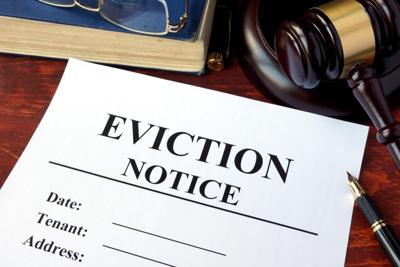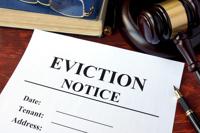ALBANY — Tenants, landlords and property owners months behind on rent or property taxes can start applying for billions of dollars of available relief at the end of the month, officials said, as the Legislature voted Monday to extend the state’s eviction moratorium four more months.
Until Monday, state executives did not release a time frame or other details as New York waits to distribute its total $2.4 billion in Emergency Rental Assistance Program COVID-19 rent relief for tenants, homeowners, small landlords and business owners. The state budgeted $100 million toward the fund.
Between 800,000 and 1.2 million households are behind in paying rent of the state’s 4.1 million tenant households, lawmakers have said, citing statistics from state housing agencies.
The state is expected to open the application process for relief for tenants, small landlords, homeowners and business owners by the end of May, state Budget Director Robert Mujica said Monday.
Officials in several state departments would not say last month after the budget passed late April 7 when the program would open to applicants.
“So, we expect to have the applications ready by the end of this month, by the end of May,” Mujica said. “So, those will then go out and then there’s an accelerated process, the 30-day process and a 60-day process for renters and landlords to participate.”
Officials continue to remain tight-lipped about qualifications for tenants or landlords to be eligible for the funding or how much of the $2.4 billion relief has been moved or spent to date.
The bill extended the state’s COVID-19 Emergency Eviction and Foreclosure Prevention Act of 2020 and the COVID-19 Emergency Protect Our Small Businesses Act of 2021 until Aug. 31.
Before the Senate voted 42-21 to extend the moratorium, Mujica and Cuomo spoke in favor of the extension.
“The moratorium extending through August gives a couple of months after the application... at the end of (May) the applications come out, which is at the end of the month,” Mujica said.
The measure, which was delivered to the governor, passed with a vote of 91-57 in the Assembly. The vote was mainly along party lines in both chambers, with a handful of Democrats voting against the extension.
A state resident must prove they endured financial hardship, or had to leave their homes because of a health condition and COVID-19 threat that led to housing instability and prevented them from meeting housing or homeowner expenses.
Lawmakers continue to be frustrated with state executives’ delay in opening the application process and starting to spend the federal allocation.
Sen. Michael Martucci, R-42, pressed bill sponsor Sen. Brian Kavanagh, D-26, why the Legislature failed to pass legislation sooner to get the federal monies moving. The state knew about $1.3 billion in federal assistance in December.
“I share my colleague’s frustration this program is not up and running as of this date,” Kavanagh, the Housing Committee chair, said on the floor Monday. “I assume OTDA is putting that [program] in place as soon as practicable.
“It is important that money get out as soon as possible,” he continued, adding, “I’ve been ready and willing and able to discuss this at any point in the last year ... but we are now looking to the Executive to roll the program out.”
The federal deadline to allocate at least half of the assistance was extended an six months to March 2022.
“So we do have some time,” Kavanagh said. “It is my hope if the rent arrears estimates are the high end, we may need more federal funding.”
The state may apply for leftover assistance unspent by other states in case of needing additional assistance, Kavanagh said, adding he was hopeful his colleagues would help secure it.
Critics reiterated focusing on the state working to spend its share by the deadline first.
Other states, such as Texas, New Jersey, Connecticut and California, have announced the procedure for tenants, landlords and business owners to apply for the relief and get the funding moving.
Applications will be handled by the state Office of Temporary and Disability Assistance.
“OTDA is at work readying the launch of the $2.4 billion Emergency Rental Assistance Program, which was just approved by the Legislature as part of the budget a few weeks ago, and we are moving expeditiously to get assistance to New Yorkers who need it most with the expectation that applications will open in May,” according to a statement Monday from Anthony Farmer, a spokesman with the Office of Temporary and Disability Assistance. “This program will support New Yorkers who are experiencing financial hardship, are at risk of homelessness or housing instability and earn up to 80% of area median income, with priority given to those with the lowest-incomes, the unemployed and other vulnerable populations. In administering this program, OTDA will work closely with local governments and community-based organizations to provide outreach and application assistance, with a focus on supporting our most vulnerable neighbors.”
Farmer referred other questions about the program to Gov. Cuomo and Mujica’s statements Monday.
“These are massive, complicated programs,” Cuomo said Monday. “Both the tenant relief and the small business relief, you have to write regulations, you have to make sure there’s no fraud, you have to send out the application and you have to fill it out.
“You want to make sure that no harm is done,” the governor added of state officials working to catch falsified applications.
Lawmakers debated into early Monday evening to extend blocking residential and commercial eviction proceedings to assist people facing hardship due to the pandemic and expand the small businesses eligible for hardship declarations.
“While we can see the light at the end of the tunnel of the global health crisis of the last year, the economic impacts on our families and small businesses have not diminished,” said Assembly Speaker Carl Heastie, D-83. “Extending these moratoriums will give people the time they need to recover financially, keep families in their homes, and keep businesses doors open.”
The state anticipates up to an estimated $2.2 billion gap in back rent and similar expenses.
“This new extension will continue to ensure that New York tenants, homeowners, business owners, and small landlords will not have to fear losing their homes or businesses,” Senate Majority Leader Andrea Stewart-Cousins, D-35, said in a statement Monday. “This pandemic has been devastating on so many levels and this legislation will help give our residents and businesses time to get back on their feet. The Senate Majority, under my leadership, has made it clear that we are committed to placing New York on a strong path to recovery.”
On Monday, Democrats reiterated arguments they made when extending the eviction moratorium to May 1 in December, that the temporary ban of evicting people from their homes is best for public health as the coronavirus pandemic continues.
Republicans argued coronavirus infections were rising in the winter, but continue to fall to levels with lower risk of community transmission. The state’s COVID-19 infection rate declined to about 1.8% over a seven-day average Monday.
GOP members cited Cuomo’s announcement earlier Monday to lift the state’s coronavirus capacity restrictions for businesses, including retail, food service, gyms, beauty salons and offices later this month as a reason why extending the moratorium was unnecessary.
“We believe, based on the data we have reviewed and based on the recommendations of the [Centers for Disease Control & Prevention] and ... the CDC’s review of the effects of letting eviction moratoriums expire prematurely, that four months seems like the right amount of time,” Kavanagh said on the floor Monday. “There’s no perfect science to that, but we at this moment, based on the data I have reviewed, we believe four months is the right amount of time.”
The legislation requires tenants, homeowners and small landlords owning 10 rental properties or fewer to submit a legal declaration of financial hardship. The declaration will halt eviction proceedings that started within 30 days of the effective date of the legislation. Gov. Andrew Cuomo’s executive order halting evictions first went into effect in spring 2020 and expired last September.
State Republicans agree millions of New Yorkers have struggled to pay their rent, mortgage and property taxes since the pandemic ravaged the world last March, but stood together against the Democrats’ approach, saying extending the moratorium is a flawed solution.
Assembly Minority Leader Will Barclay, R-120, said extending the blanket moratorium at all, let alone for several more months, will be harmful to landlords and tenants alike and lead to a drastic decline in affordable housing options as landlords face foreclosure or stop renting properties.
Assemblyman Jake Ashby, R-107, agreed extending the moratorium will exacerbate a state housing crisis.
“By preventing any ability for our local property owners to recover nearly 18 months of back-rent, we have caused tremendous hardship for countless New Yorkers who continue to struggle to provide for their families,” Ashby said. “Further complicating the issue, is that many New York property owners are not eligible for the Federal relief programs which only apply to counties of greater than 200,000 residents. I am working diligently with colleagues from both parties and all corners of our state to bring substantial and meaningful relief to our property owners.”
Republicans in December were largely opposed to and voted against extending the state’s eviction moratorium to May 1. Last week, Republicans spoke out against the planned expansion of the eviction moratorium. The vote was originally slated for last Wednesday, but was moved to Monday.
Sen. Daphne Jordan, R-43, voting against the extension blasting the state for the delay in distributing $2.4 billion in federal relief to tenants, landlords and homeowners.
“If we keep kicking the can down the road and excusing rent from being paid, it’s highly likely the federal monies that are given to us will not be enough to provide relief to all landlords,” Jordan said. “...It’s critical to remember landlords are business owners and many are small businesses — mom and pops, not Fortune 500. I’ve heard from countless landlords across the 43rd Senate District so many have taken a financial hit. New York should focus on immediate assistance into the hans that can’t afford to wait rather than extending the eviction moratorium for four months. ...in the long run, [they] may never recover the rent due to the time. Just remember: Time is money.”









